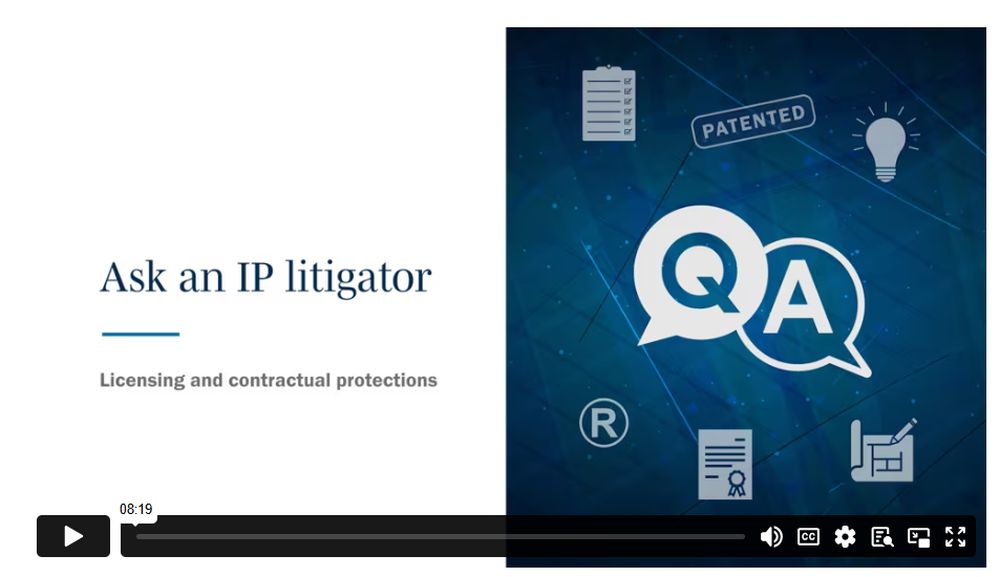- within Intellectual Property topic(s)
- in Asia
- in Asia
- in Asia
- in Asia
- with readers working within the Retail & Leisure and Law Firm industries
- with Inhouse Counsel
Video transcript
Nicole Mantini (00:06): Hello and welcome to Ask an IP Litigator. Today we're going to quickly run through some of the unique issues that arise in licensing agreements. When the thing that you're licensing is intellectual property, as opposed to, say, a car or real estate. So Yael, why don't you start us off? How is licensing IP unique?
Yael Bienenstock (00:24): So first of all, there are many businesses where a good chunk of the value of the business sits in their intellectual property rights. And these are things like biotech, healthcare, hi-tech engineering, just to name a few industries. And licensing can be really helpful in these industries. It can generate significant revenue for the licensor and can allow licensees to do things like enter new markets or access new technologies that it might not otherwise have access to.
Licensing can also provide a way for companies to collaborate together in order to share risk. If it's done right, licensing can be a real win-win, but there are certainly pitfalls you want to avoid. Regardless of what you are licensing. You need to conceptualize IP as a bundle of rights: rights for different purposes, rights in different jurisdictions. The whole point of the licensing is to license some rights in the bundle, but to preserve others.
So it's really important going into the agreement that there's a meeting of the minds about the commercial purpose of the deal and what rights in the bundle are being licensed and which rights are being preserved. And so here are some things to think about. You want to think about whether the agreement is limited to a particular jurisdiction or territory.
And if it is, are all rights being licensed confined to that territory or are there some rights that are extraterritorial? You also want to think about whether a license is limited to certain purposes. And this is particularly true of complementary rights, which are typically rights that are not the main drivers of the deal in and of themselves, but they support the driving rights.
So, for example, if you're talking about a distribution agreement, then the licensee is primarily licensing the right to sell the product, but it may also need a license to a trademark or to the data that supports the technology in order to facilitate its sales. And that license could specify that the licensee has the right to use the trademark or the data, but only for the primary purposes of, let's say, selling the product.
Other important questions: is the license exclusive or not exclusive? What about improvements to the IP? Does a bundle of rights and the license include those as well? And here's another really important one, Niki, that you can tell us about: what about maintenance and enforcement of IP against third parties?
Nicole Mantini (02:39): So Yael and I are litigators. So of course enforcement is always at the top of our mind. But one of the main features, of course, of any intellectual property right is exclusivity. So an important aspect of licensing rights is going to be determining who is responsible for protecting those rights as against, you know, the world. For example, for a registered right, you're going to want to make sure that your agreements are clear about who's responsible for any maintenance processes so that things don't slip through the cracks.
For some types of IP, some of these obligations are going to be pretty clear. The payment of maintenance fees for patents, for example. But you may have licensees who are marketing patented technology where you need to think about additional protections, like regulatory listing requirements for patents that will ensure that the IP can actually be enforced against the people who might be, looking to take advantage of it in the jurisdiction.
You also have to think about things like the use of protected designations, trademark copyright designations, for example, and how you will require your licensees to use those kinds of markings. For some kinds of IP, and I'm thinking in particular here about things like trade secrets or know-how, the protection is going to come by the maintenance of the secrecy in, in the, in the information.
So you'll want to make sure that your agreements provide adequate coverage there and impose the types of obligations on your licensees that will actually help to maintain and protect those rights. Your licenses also need to clearly delineate who is responsible for enforcing the IP, if it is improperly used by a third party. Many IP licenses will allow a licensee to step in and enforce IP in the event that the licensor does not do so.
But moreover, licensees may actually have their own independent claims for damages for infringement of IP rights, and they may need to be parties to any enforcement mechanisms. So your licenses have to contemplate those possibilities. Your licensee may also be closer to the market, and therefore in a better position to assess whether or not infringement may be happening. Many license agreements will include requirements on licensees to report on any suspected infringement to the licensor, so that enforcement steps can be taken in a timely way.
As that answer illustrates, sometimes the considerations for your license are going to turn on whether or not the IP in question is dictated and regulated by statute. So, Yael, can you elaborate a little bit more on how that consideration fits into the picture?
Yael Bienenstock (05:05): Sure. So in some ways it makes it more straightforward. So for example, if the IP that's the subject of the license is a patent, then a patent only grants rights to exclude others in that territory. So it's inherently territory-limited. And the rights are going to be defined by the claims in the patent. In contrast, other types of IP like know-how or data are amorphous and it's really important to think about specifically what you do and do not want a license because you don't have a statute that is delineating the rights it's all in the contract.
The other place that the statutory context comes into play is how you deal with regulatory rights and obligations. So, for example, if you're licensing rights to a drug, you may also want to grant rights under regulatory regimes such as the FDA regulations or Health Canada's Food and Drug Regulations, or perhaps more commonly in a license agreement, you might require the licensee to comply with certain regulatory obligations like manufacturing requirements or risk management.
So that's about the statutory context or at least an overview. And Niki, what about limitation of liability clauses? We see these in most licensing agreements.
Nicole Mantini (06:13): They're usually the part of the agreement that nobody wants to spend a lot of time thinking about. But they actually can be really important. So in addition to thinking about how to enforce your IP against third parties, licensors and licensees also need to think about how the liability or risk between them will be shared. This kind of risk sharing often shows up in two kinds of provisions.
So limitations of liability clauses, which limit the amount of liability that a particular party will have for certain actions or events occurring, and indemnity clauses, which are provisions that shift the cost or expense of certain types of liability onto the other party. They're technically two different kinds of provisions, although we sometimes refer to them generally as being sort of in the limitation of liability family.
And it's typical that parties to an IP license will want to limit liability for activities of the other party that they don't control, and that might result in an infringement claim, for example, being brought against them. So a licensee may request a limitation of liability in respect of claims that the IP that they're licensing is actually infringing on someone else's rights.
And a licensor, for example, might request a limitation of liability for any third-party claims that come out of the licensee's particular use in the market of the licensed rights, or maybe from some activity that the licensee's undertaking that's unauthorized by the license. And so, thinking about these and spending the time to think about how risk is going to be shared and how the limitation of liability will operate in your license agreement is a really important thing to do, and will maybe prevent these clauses from appearing later down the line if you're faced with some kind of litigation.
So hopefully that was a helpful overview of some of the key considerations to keep in mind when you're thinking about licensing your IP and drafting your IP licensing contracts. And hopefully you can take some of that guidance away for your future contract negotiations.
Yael Bienenstock (08:11): Thank you. And thanks, Niki.
Nicole Mantini (08:11): Thanks.
For businesses whose value lies in their IP rights, licensing offers significant advantages to licensors and licensees alike.
In this video, Niki Mantini and Yael Bienenstock offer a look at some of the key considerations for parties to take into account when it comes to IP licensing, including:
- Commercial limitations and exclusivity rights
- Maintenance and enforcement of IP rights against third parties
- Regulatory rights and obligations
- Limitation of liability clauses
Click here to see other videos in this series.
The content of this article is intended to provide a general guide to the subject matter. Specialist advice should be sought about your specific circumstances.



